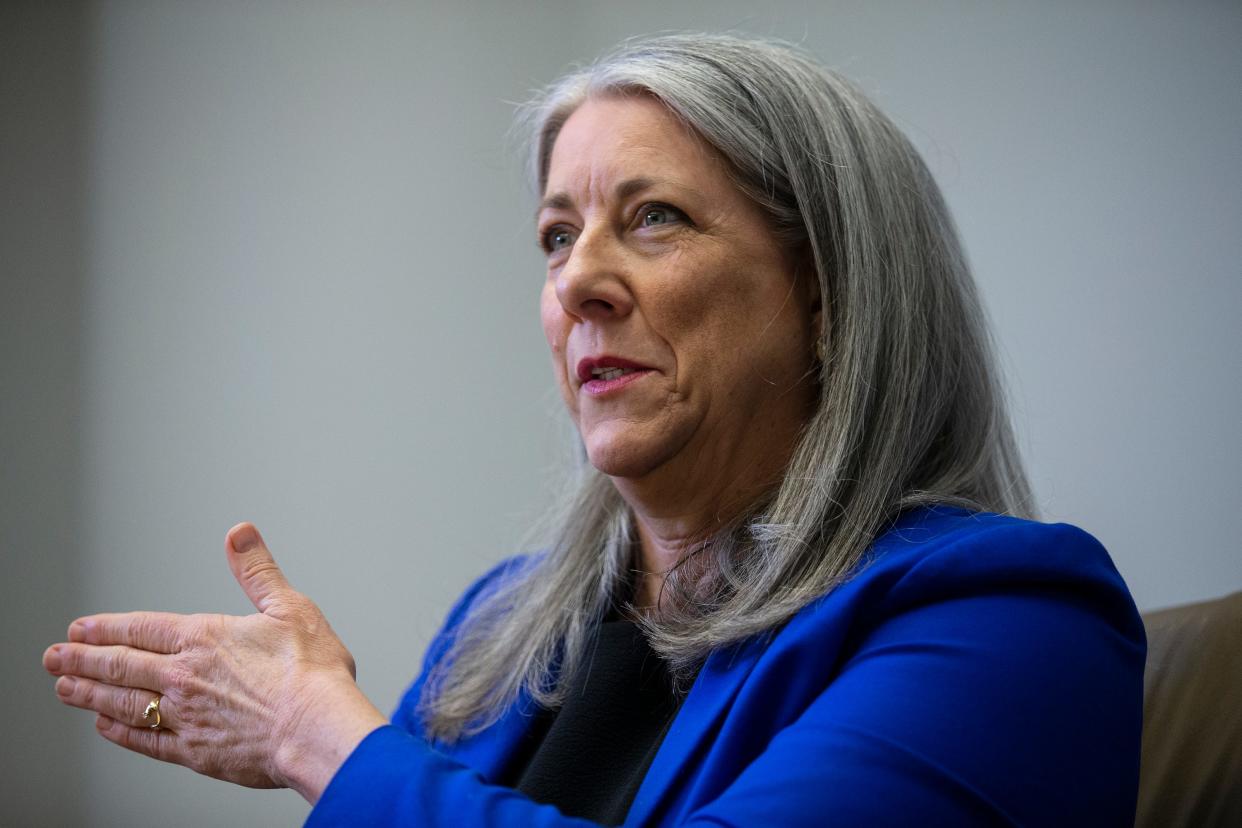License suspended for unpaid fines? Polk County program could get you back on the road

For as little as $1 a month, Polk County residents with suspended driver's licenses have a chance to restore their driving privileges through a program revamped under County Attorney Kimberly Graham.
Under Iowa law, driver's licenses can be suspended for a number of reasons — not only for bad driving behavior but for unpaid fines and court costs and other non-driving problems. Iowa law also allows county attorneys to establish repayment plan options so people can legally get back on the road while making payments toward settling those debts.
Previously, Polk County's license reinstatement plan required a $100 down payment and a minimum monthly payment of $50. Graham, who took office in 2023, said participation in the program has more than doubled since her office began offering less-expensive income-based repayment plans last year, using a tool developed by Iowa Legal Aid.
Graham told the Register the overhauled program is meant to remove barriers for disadvantaged families to clear their debts and follow the law, challenges she frequently saw before her election when working as an attorney with the Polk County Recovery Court program.
"It would come up over and over again, 'My license is suspended,' and a lot of them flat out ... don't have that kind of money. And if they do spend it on that, they're not going to spend it on food for their kids or get their rent paid," Graham said. "I just wanted to make sure that we could do something that would allow anybody who was willing and able to get on a payment plan to do so, financially."
Why does Iowa suspend licenses over debts?
Nearly every state allows suspension of driving privileges to compel payment of court costs. A 2007 report by the Des Moines Register found that at that time there were 310,000 Iowans, including more than 1 in 10 drivers in some counties, with sanctions against their licenses.
But the practice in recent years has drawn criticism from across the political spectrum. A 2022 report by the right-leaning R Street Institute argued such suspensions do not benefit public safety or improve collections on outstanding debt.
From 2016: New Iowa law on court debt aims to keep drivers on road
Christi Smith, the report's author, told the Register that a person with a suspended license has three options: pay off the debt, which they likely cannot afford to do; stop driving entirely; or continue driving as needed to pick up children, get groceries, go to work and do other necessary tasks. That choice is by far the most common, she said, exposing the person to further prosecution, fines and costs for driving on a suspended license.
"It’s what ensnares people in a cycle of poverty and legal system involvement," she said. "So, not only is the suspension ineffective at collecting debt, it incentivizes people to drive under the suspended license to earn the money they need to repay the debt, while increasing the likelihood that they’ll incur additional citations, fines and fees for driving while suspended."
Instead of using driver's licenses to try to force debt payments, Smith said, states should consider better options, such as seizing tax refunds or garnishing wages.
Calculator uses IRS data to estimate payments
Graham said the inspiration for the program came from Alex Kornya, an attorney with Iowa Legal Aid, who has helped develop an online repayment calculator based on the Internal Revenue Service's collection standards, which take into account a person's income and local and regional variations in the cost of housing, transportation and other expenses to estimate how much the individual is reasonably able to pay.
Iowa Legal Aid did not provide a comment when asked, but the repayment calculator website notes that while courts are required to assess a person's ability to pay fines and fees, there is little guidance or consistency on how they are supposed to do that. The calculator can fill that gap by suggesting how much a given individual actually is able to pay — in some cases, as little as $1 per month.
Smith said Polk County's approach to income-based repayment "is very much in line with the existing body of research on how government debt should be assessed and collected."
A 109% increase in license reinstatement plans
Polk County's repayment program covers only certain court debts. Unpaid child support debts, another common cause of license suspensions, are not eligible for the program under state law. Graham also emphasized that the repayment program does not apply to motorists who've had their licenses suspended by the Iowa Department of Transportation for unsafe driving.
Her office doesn't have data on how much actual collections have increased through the program, since much of that money goes to the judiciary rather than to the county attorney. She also doesn't have data on how many Polk County residents have suspended licenses due to court costs.
But her spokesperson, Lynn Hicks, said that since the implementation of income-based repayment, the number of people signed up for repayment plans jumped from 318 in May 2023 to 666 in May 2024, a 109% increase.
"When you give people real opportunity to pay (what) they can actually afford, they generally do it," Graham said. "They want to pay their fines and fees. They just need a path to do so."
William Morris covers courts for the Des Moines Register. He can be contacted at wrmorris2@registermedia.com or 715-573-8166.
This article originally appeared on Des Moines Register: Polk County's easier payment plan for suspended licenses shows results
